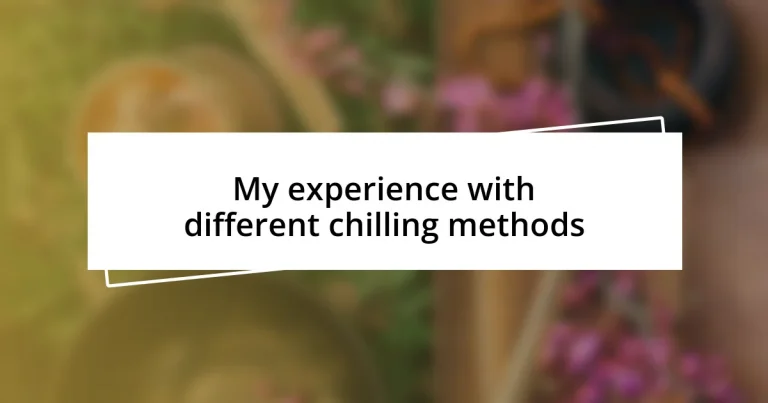Key takeaways:
- Chilling methods, such as ice baths and cold packs, significantly enhance physical recovery, reduce inflammation, and improve mental clarity.
- Ice immersion techniques provide both physical and mental challenges, promoting resilience and heightened body awareness during recovery processes.
- Experimentation with different chilling techniques, including combining methods, can lead to personalized and more effective recovery experiences.

Chilling methods overview
When I think about chilling methods, a few key techniques come to mind. Ice baths, cold packs, and specific machine technologies each offer unique benefits and applications. Have you ever tried a method that surprised you with its effectiveness? I have, and it completely shifted my perspective on chilling.
For instance, I recall my first experience using an ice bath after a tough workout. At first, it seemed daunting, but the refreshing shock to my system was invigorating. It not only helped reduce muscle soreness but also enhanced my recovery time, proving that sometimes we need to push through discomfort to find real benefits.
In contrast, I’ve also explored the convenience of cold packs. They’re surprisingly versatile and perfect for quick relief after a long day. It made me wonder how often we overlook simple solutions that can fit seamlessly into our busy lives. Each method has its place, and what works wonders for one person might not resonate with another, highlighting the importance of finding what suits you best.
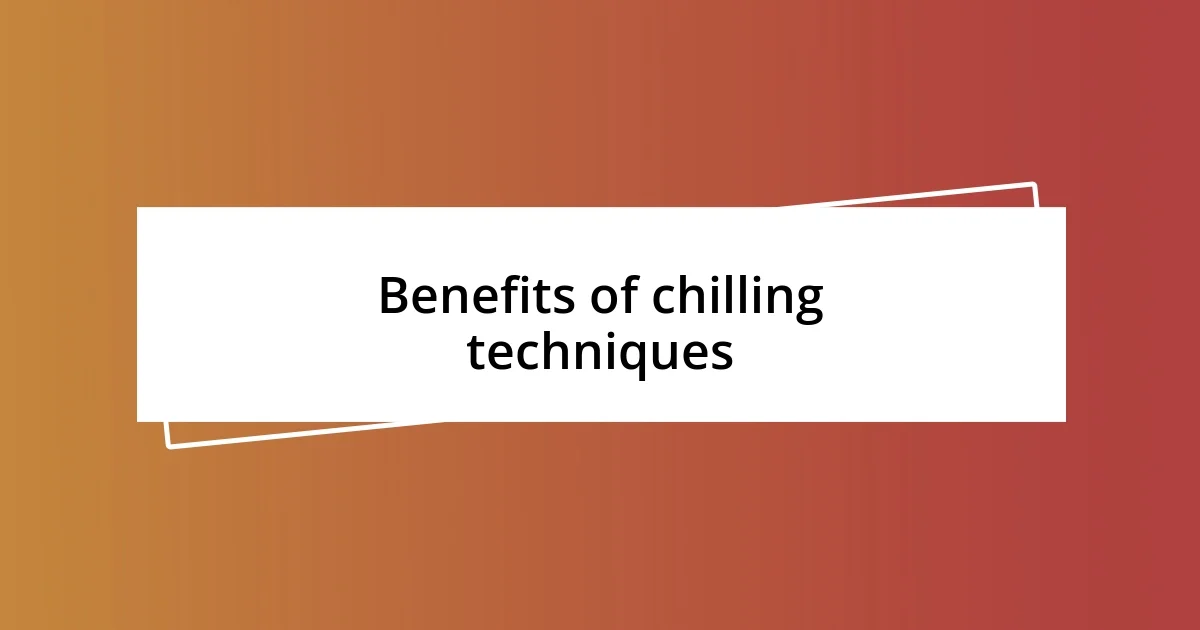
Benefits of chilling techniques
Chilling techniques offer a range of benefits that go beyond mere temperature reduction. From my experience, I’ve found that these methods can significantly enhance recovery, both physically and mentally. After a long, grueling day, wrapping myself in a cold pack not only alleviates muscle tension but also brings a wave of calm that helps me unwind. It’s fascinating how something as simple as applying cold can transform our state of mind and body.
Here are some notable benefits of various chilling techniques:
– Reduced Inflammation: Chilling methods effectively minimize swelling and discomfort post-exercise.
– Enhanced Recovery: Ice baths can speed up the recovery process, allowing athletes like me to bounce back quicker.
– Pain Relief: Cold packs can numb pain, making them an excellent option for soothing aches.
– Satisfaction in Ritual: I personally enjoy the routine of my cooling techniques, which adds a sense of discipline and self-care to my daily life.
– Mental Clarity: Engaging with cold treatments often sharpens my focus and gives me a refreshing pause from daily stressors.
Each of these benefits showcases how chilling techniques can play a transformative role in our physical and emotional well-being.
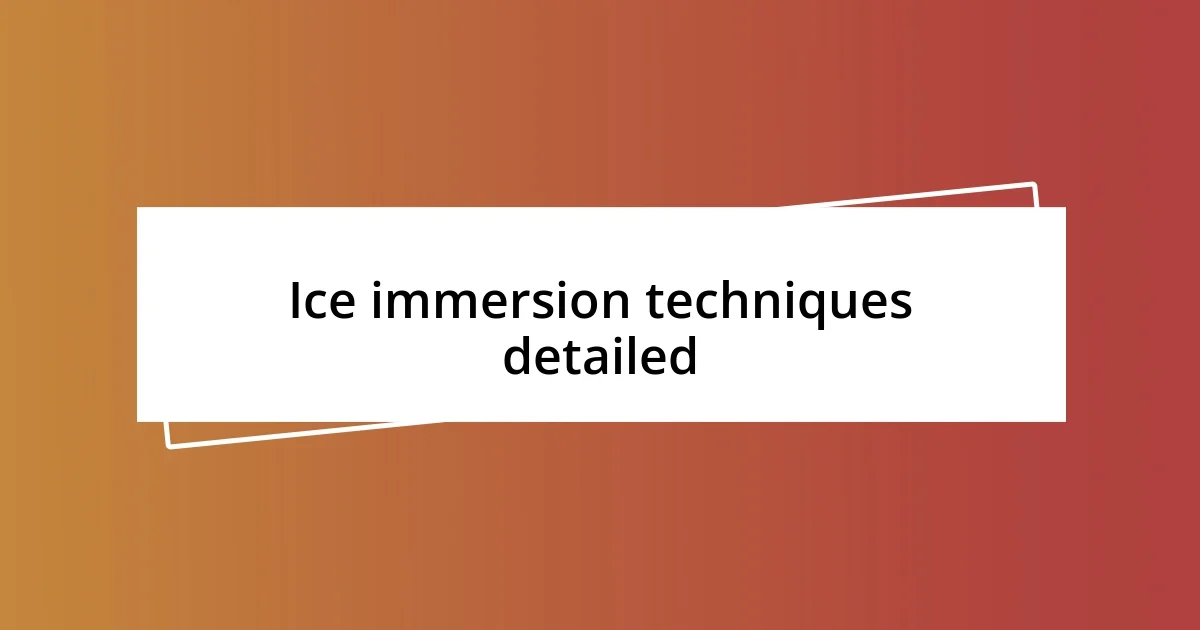
Ice immersion techniques detailed
Ice immersion techniques have become a prominent method in recovery practices, often praised for their effectiveness. I remember my first plunge into an ice bath; it wasn’t just cold—it felt like my body was waking up in the most jarring yet refreshing way. The initial shock transformed into a comfortable numbness, and as I emerged, it felt like the stress of the day melted away, leaving clarity and rejuvenation.
In contrast, I experimented with contrast baths—alternating between ice and warm water—which I found incredibly invigorating. The drastic temperature shifts created a unique sensation that not only tingled my skin but also energized my muscles. I realized that these sensations can teach us about our limits and resilience; it’s almost meditative. Interestingly, I’ve learned that ice immersion isn’t just a physical remedy. It can be a mental challenge that cultivates strength, pushing us to confront discomfort and emerge stronger on the other side.
As I dive deeper into various ice immersion techniques, I’ve noted their differences and preferences based on personal experiences. Some swear by ice baths for muscle recovery, while others prefer cold water pools or even ice packs for targeted relief. Each method serves a purpose, yet they all share a common goal: enhancing recovery in our busy lives.
| Method | Description |
|---|---|
| Ice Bath | Full-body immersion in cold water, effective for overall recovery. |
| Contrast Bath | Alternating between cold and warm water to stimulate circulation and reduce soreness. |
| Cold Packs | Localized cooling for quick relief and inflammation reduction. |
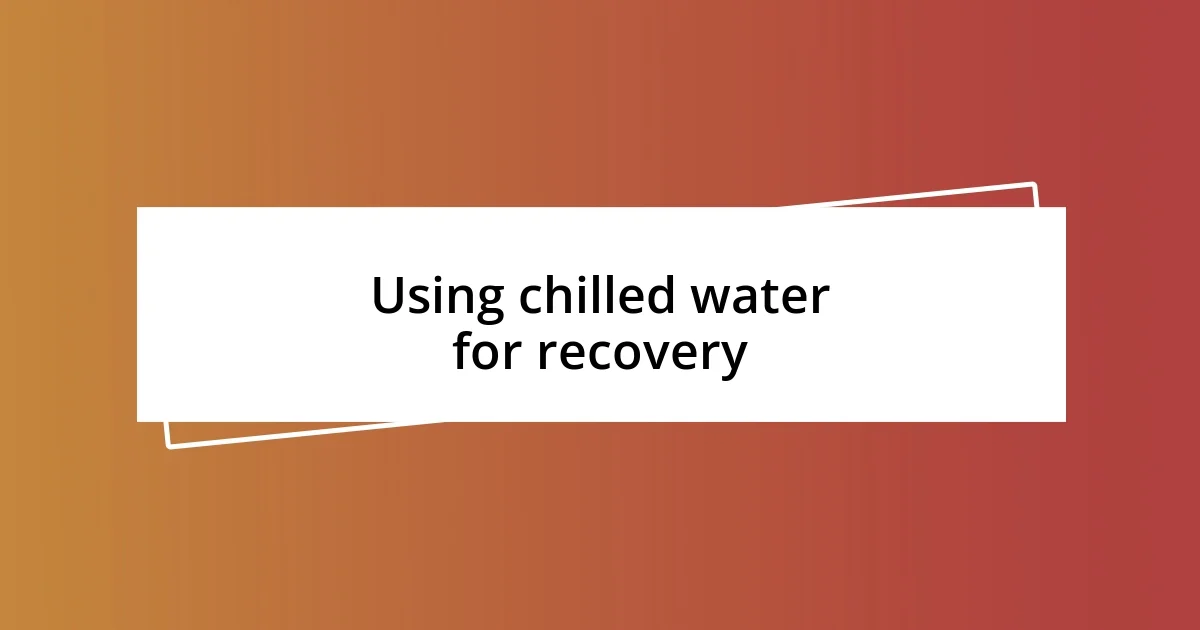
Using chilled water for recovery
Using chilled water for recovery has been a game-changer for me. After a challenging workout, I often fill a tub with cold water and settle in, feeling the chill wrap around my muscles. There’s something soothing about the sensation—it’s like the water is gently pulling the tension right out of my body, leaving behind a refreshing sense of relief.
One of my memorable experiences was after a particularly intense running session. I jumped into a cold water bath, and at first, it was an electric shock that took my breath away. But then, as I focused on my breathing, the chill morphed into a meditative state. I emerged feeling not just physically revived, but mentally awakened, ready to tackle whatever came next. Isn’t it interesting how something so simple can have such profound effects on both the body and mind?
I also noticed that incorporating chilled water recovery into my routine has helped me develop a stronger connection with my body. Each time I use it, I find myself tuning in to how my muscles respond and recover. It’s as if I’m learning to listen to my body’s needs in real-time. This practice reinforces the idea that recovery isn’t a one-size-fits-all approach. What works for one person might not be as effective for another, and I appreciate that exploration process. How do you find your own rhythm in recovery?

Cryotherapy benefits and practices
Cryotherapy has become a fascinating part of my recovery routine, and the benefits are genuinely remarkable. The first time I stepped into a cryo chamber, I felt a rush of cold air envelop me, quite the sensory experience! As the temperature dropped, I noticed my muscles began to relax, almost seeming to breathe a sigh of relief. After just a few minutes, emerging from the chamber felt revitalizing—like shedding the weight of fatigue and stress. It’s incredible how something as simple as temperature can have such an invigorating impact on both body and mind.
In my experience, cryotherapy isn’t just about physical recovery; it plays a role in enhancing mood too. I remember one particularly tough week, both physically and mentally. After a session in the cryo chamber, I walked out feeling lighter, my mind clearer. It’s intriguing to think about how a short exposure to extreme cold can stimulate the release of endorphins, those feel-good hormones. Have you ever felt that post-cold rush? It’s like a natural high, and it becomes addictive in the best way possible, encouraging me to explore more about how chilling methods can support my emotional well-being.
Another aspect that I’ve come to appreciate is the efficiency of cryotherapy sessions. In today’s fast-paced world, who doesn’t love a quick recovery solution? I often find myself in and out of the chamber in under 15 minutes. That short time investment leaves me not only refreshed but also ready to take on the day. The streamlining of recovery into such a brief window fascinates me—don’t you think we could all benefit from more efficient recovery options? It makes me curious about what other techniques might offer such powerful rewards in compact doses.
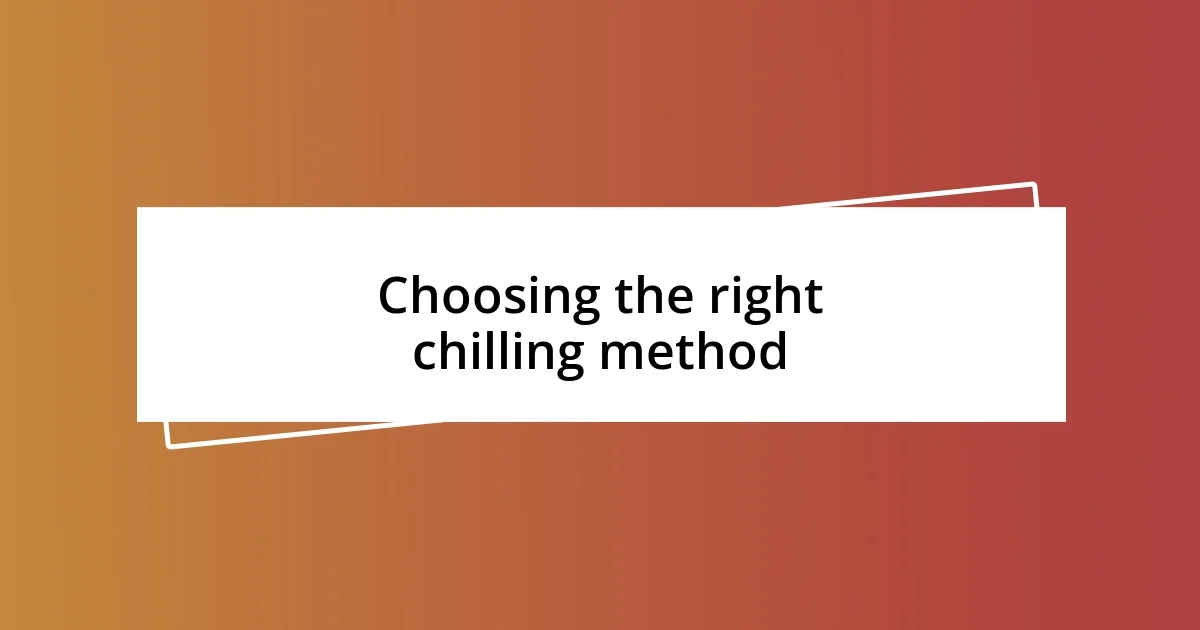
Choosing the right chilling method
When it comes to choosing the right chilling method, personal preference plays a significant role. I remember the first time I experimented with ice packs after a tough cycling session; I found the initial discomfort surprisingly motivating. There’s something about that jolt of cold that urges me to embrace the moment, similar to a challenge that must be faced head-on. Do you have a chilling experience that pushed you out of your comfort zone?
I often find myself weighing the pros and cons of each method, from chilled baths to cryotherapy. For instance, while I love the immersive feeling of a cold water bath, I’ve come to appreciate the convenience of ice packs for quick recovery sessions. Each method has its own unique vibe, and it can be fascinating to see how they align with my needs after different workouts. Have you tried mixing methods to see what feels best for you?
Moreover, there’s an element of experimentation that I truly enjoy in this process. I recall a time when I combined chilled water immersion with a few minutes of deep breathing, and it transformed my recovery significantly. The synergy of techniques not only accelerated my muscle recovery but also left my mind feeling liberated. Isn’t it amazing how exploring different approaches can lead to unexpected benefits? Finding that sweet spot between effectiveness and comfort is an adventure worth pursuing.
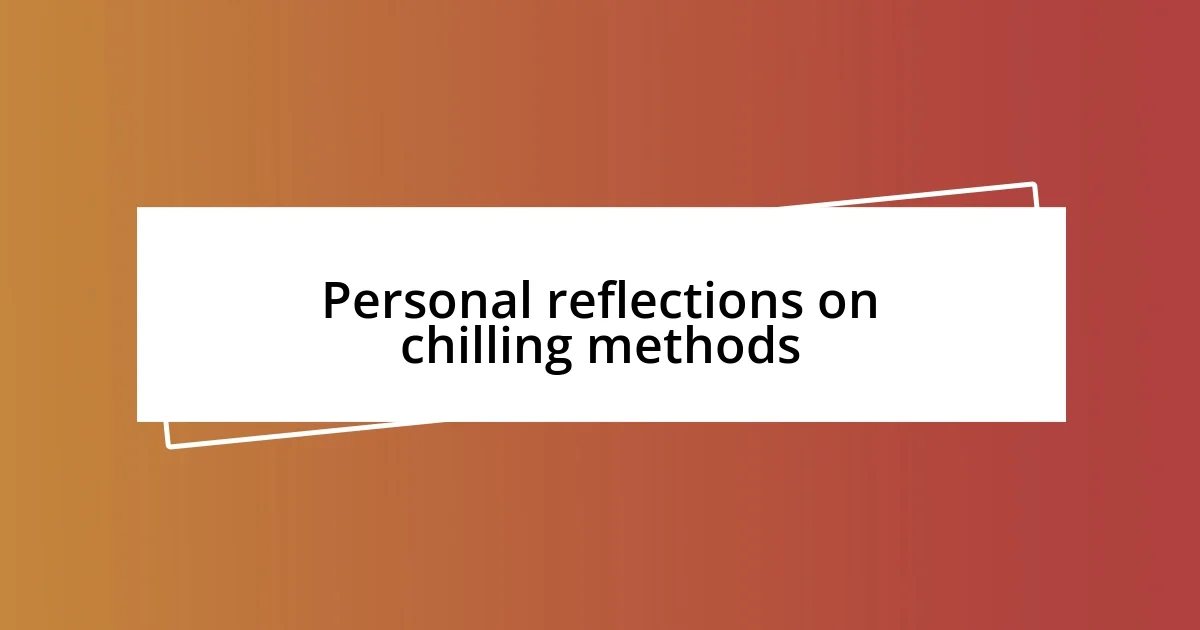
Personal reflections on chilling methods
I’ve had my fair share of experiences with different chilling methods, and each one has left its mark on me. One chilly evening, I decided to try an ice bath for the first time after a long run. I’ll never forget the way the cold water sent shockwaves through my body; it was intense but oddly exhilarating. I remember thinking, “Is this what real recovery feels like?” The sharpness of the cold made me hyper-aware of my body, each muscle waking up to the sensation. It’s a moment that still lingers in my mind—it pushed my limits and changed my perception of recovery.
There’s also something quite profound about the mental aspect of chilling methods that I’ve come to realize. I remember a particularly stressful week where I opted for cryotherapy. Stepping into that chamber, I felt the cold begin to settle around me, almost as if it was wrapping me in a protective embrace. When I walked out, my mind felt clearer, free from the overwhelming clutter that had clouded my thoughts all week. It makes me wonder—how often do we overlook the potential benefits of these chilling experiences for our mental health? It’s something I find fascinating and worth exploring more deeply.
Trying out different chilling methods has turned into a little adventure in my life. I discovered that combining techniques can yield surprising results. For instance, one day after a grueling workout, I experimented by alternating between ice packs and a quick jog in the brisk evening air. That mix of heat and cold stirred a unique sense of vitality within me. Have you ever tried pairing different techniques? It’s a reminder that there’s no one-size-fits-all approach; part of the fun lies in mixing and matching what feels best for me. Each experience teaches me something new, adding layers to my recovery routine.












